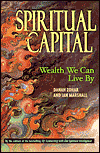
It is good to Trust the Goddess, and we know She Will Provide, but it’s also good to collect and manage some assets. Business isn’t always a bad thing. Spiritual Capital is a business book. It wasn’t written with pagans in mind, but as we read about material capital (money and the things money can buy), social capital (“the wealth that makes our communities and organizations function effectively for the common good”), and spiritual capital (“our shared meanings and values and ultimate purposes”), we see that pagans are not the only people on the planet who care about Gaia and her children.
Zohar and Marshall open chapter 1 by retelling the myth of Erisychthon, a greedy, profit-driven businessman. His property shelters a large, holy tree, but Erisychthon sees the tree only in terms of lumber and cuts it down. One of the gods who lived in the tree curses him with insatiable hunger. First Erisychthon eats everything in his storehouses. Then he converts every crumb of his capital into food and eats it all. Finally, having consumed everything he can get his hands on and still feeling that bottomless hunger, Erisychthon begins to devour his own body.
Sound familiar? Today, when Gordon Gecko is still Wall Street’s guiding spirit, when crony capitalism seems to be our government’s guiding principle, and when lobbyists from big oil and electric companies are trying to pulverize the Kyoto Protocol on global warming, we need a business paradigm that makes the machinations of Enron, Tyco, and WorldCom unthinkable. We need to find a new business paradigm before business-as-usual makes our planet uninhabitable.
In this small book (just over 200 pages), Zohar and Marshall write about motivation, spiritual intelligence, transformation, paradigm shift, and the establishment of what they call a new order of Knights Templar. These will be business leaders who see “outside the window” and whose business will be to care about the whole planet.
Business as we know it today is only two hundred years old, whereas human commerce itself may date back forty thousand years. Modern capitalism was created by “a small handful” of philosophers of the British Enlightenment. Adam Smith, John Stuart Mill, and their fellows admired the work of Isaac Newton; they contributed to the scientific management theory of Frederick Taylor. Individual business was nothing more than “a vast economic machine oiled by money” (p. 25).
But economic capitalism will not save the planet. We need to adopt spiritual capitalism. The authors describe companies that are already creating spiritual capital. Merck, for example, is actually giving away a medicine named Mectizan, which prevents river blindness. As they list qualities of companies that work with spiritual capital, it’s likely that any pagan reading the book will identify with the following: having self-awareness, being vision-led, having “a high sense of holism or connectivity,” being compassionate, celebrating diversity, daring to stand out from the crowd, raising “fundamental Why questions,” being spontaneous, seeking a positive response to adversity, maintaining a sense of deep humility, and having a sense of vocation (pp. 29-30).
Using the newest scientific findings in neurology (including the brain’s “God Spot” and the 40 Hz wave that creates a higher consciousness), field theory and chaos theory, the authors show how business can be transformed. One of the most interesting sections is the Scale of Motivations, which range from +8 (enlightenment) to -8 (depersonalization, or the lowest dehumanization). Most people, alas, live their lives by the first four “deficiency needs,” which are self-assertion (“thoughtlessness, unbridled competitiveness, too much pride, self-centeredness, and aggression”), anger, craving (the source of the Seven Deadly Sins), and fear. This describes Gordon Gecko and his real-life buddies. Other people live by the first four “higher needs,” which are exploration, gregariousness and cooperation, power-within (though they discuss power-over here, there is no mention of Starhawk), and mastery. These chapters alone are worth the price of the book.
This book isn’t just for CEOs and MBAs. What Zohar and Marshall propose is something every one of us should read, contemplate, and act on. This book is so interesting, in fact, that a review is tempted to offer quotations from every page.
~review by Barbara Ardinger, Ph.D.
Author: Danah Zohar and Ian Marshall
Berrett-Koehler, 2004
